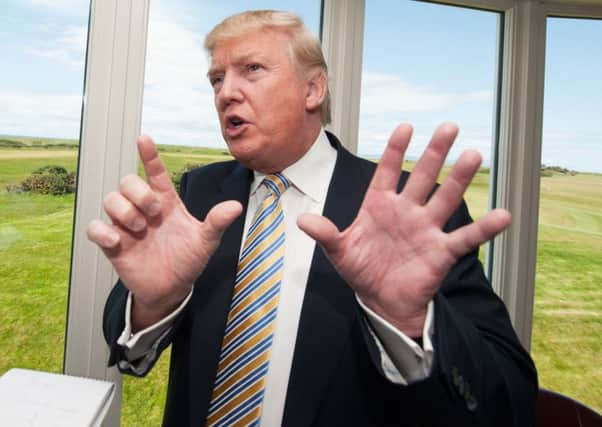Martyn McLaughlin: Media must cover Trump with purpose and aggression


There have been times when the swirl of chaos whipped up by the Trump administration has sent the fourth estate into a tailspin, forcing journalists to chase a succession of disparate, ever-shifting controversies, while responding to the daily diet of wrath, misdirection, and fabrication served up by the US president on social media.
It has, for the most part, been a breathless, thankless task, akin to trying to complete a 1,000-piece jigsaw puzzle during an earthquake. Yet of late, a new-found resolve has been evident, none more so than in the aftermath of Mr Trump’s extraordinarily obsequious display in Helsinki by Vladmir Putin’s side on Monday evening.
Advertisement
Hide AdAdvertisement
Hide AdLess than halfway into Mr Trump’s term, the focus of the press is sharpening and its vigour seems renewed. As Margaret Sullivan, a media columnist with The Washington Post, astutely put it, the future coverage of however long Mr Trump has left in office will require not only clarity, but “moral force”. Reporting the Trump administration requires fairness, but it demands aggression.
This instructive observation may have been intended by Ms Sullivan as a clarion call to her US colleagues, but it ought to apply equally here in Scotland, where two of Mr Trump’s most prestigious overseas resorts – Trump Turnberry and Trump International Golf Links – are based.
In the grand scheme of the Trump Organisation’s sprawling, opaque global portfolio, that might seem like a peripheral presence, but this is not about putting a kilt on a global story. Increasingly, Mr Trump’s Scottish interests appear important when it comes to assessing the bigger picture of his finances and the spectre of Russia.
For several months now, I have been investigating the 72-year-old’s business dealings and financial arrangements in Scotland. The majority of the coverage has dwelt on how Mr Trump’s entities here are benefiting financially from his own government; in today’s Scotsman, for example, I have a story revealing how the US State Department paid his Turnberry firm more than £50,000 in connection with his three-day working visit to the UK.
In past presidencies, such a revelation about the commander-in-chief might well have been seized upon as a major scandal. But in the Trump maelstrom, where political norms and conventions have been torn asunder, they register as ripples at best.
But it is vital to document these little outrages for two reasons: firstly, they raise legitimate questions about the ethics of Mr Trump’s ability to enrich his business empire via his presidency; secondly, who knows where they might eventually lead?
Only last week, the estimable New Yorker magazine unveiled a new, regular column, entitled the Swamp Chronicles, devoted to tracking the money trail of Mr Trump’s administration and businesses, in much the same way as David Fahrenthold has been doing for The Washington Post.
In its inaugural edition, the journalist, Adam Davidson, raised several prescient questions about how – and why – Mr Trump has ploughed vast sums of money into Turnberry, which has, as we well know, yet to return a profit.
Advertisement
Hide AdAdvertisement
Hide AdPointing out that there was no way of knowing where Mr Trump and the Trump Organisation secured the money to purchase and refurbish the South Ayrshire hotel and golf course, Mr Davidson noted: “Although we cannot say that Trump himself knowingly engaged in money laundering, we do know with certainty that much of his business in the past decade was in the industries most known for money laundering, in the locations most conducive to money laundering, and with people who bear the key hallmarks of money launderers.”
The issue of where the money came from for Turnberry and Trump International Golf Links is a key to an unknown lock, and to see it raised with such forcefulness and vim is refreshing.
As Mr Davidson’s article concedes, there is much work still to be done. The fact is that while we have a considerable understanding of the dire financial performance of Mr Trump’s businesses in Scotland thanks to the relative transparency of Companies House records, the entities registered in the UK form part of a byzantine corporate network about which very little is known.
In recent weeks, I have been piecing together the array of interrelated limited liability companies (LLCs) behind Turnberry and Trump International Golf Links.
They include Trump Scotland Member Inc, incorporated in the US state of Delaware on 1 March 2006, and Scotland Acquisitions LLC, set up in Delaware three weeks later. Or then there is Turnberry Scotland Managing Member Corp and Turnberry Scotland LLC, both of which were incorporated in Delaware on 9 April 2014. Is Mr Trump the sole party behind these entities, or are there other actors? It is, for the moment, impossible to know.
In Delaware, a tax haven in the heart of one of the world’s biggest democracies, there is no requirement for LLCs to publish financial information or disclose the identity of their partners. And if an LLC is sued, the personal assets of the individual partners are not at risk. It is, in short, a way of conducting clandestine business affairs while operating inside the law.
The paper trail, for the moment at least, has reached a dead end, but the media’s strategy must remain the same: follow the money.